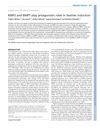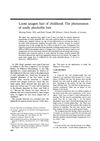 96 citations,
April 2007 in “Journal of Investigative Dermatology”
96 citations,
April 2007 in “Journal of Investigative Dermatology” Grafted rodent and human cells can regenerate hair follicles, but efficiency decreases with age.
 95 citations,
February 2019 in “The New England Journal of Medicine”
95 citations,
February 2019 in “The New England Journal of Medicine” Mutations in the PADI3 gene are linked to a higher risk of scarring hair loss in women of African descent.
 95 citations,
November 2016 in “Journal of The American Academy of Dermatology”
95 citations,
November 2016 in “Journal of The American Academy of Dermatology” Treatments for permanent hair loss from scarring aim to stop further loss, not regrow hair, and vary by condition, with partial success common.
 95 citations,
July 2010 in “Genes & development”
95 citations,
July 2010 in “Genes & development” Notch/CSL signaling controls hair follicle differentiation through Wnt5a and FoxN1.
 94 citations,
September 2014 in “Therapeutic Delivery”
94 citations,
September 2014 in “Therapeutic Delivery” Nanoparticles can improve skin treatments by better targeting hair follicles, but more research is needed for advancement.
 94 citations,
January 2000 in “The Journal of Clinical Endocrinology and Metabolism”
94 citations,
January 2000 in “The Journal of Clinical Endocrinology and Metabolism” Spironolactone most effective for hirsutism, but has side effects.
 93 citations,
February 2008 in “Atmospheric environment”
93 citations,
February 2008 in “Atmospheric environment” Ozone reacts more with unwashed hair, producing compounds due to scalp oils, which could lower ozone exposure but increase exposure to reaction products.
 92 citations,
May 2014 in “The American Journal of Medicine”
92 citations,
May 2014 in “The American Journal of Medicine” The conclusion is that early diagnosis and a multi-system treatment approach are crucial for managing PCOS and its associated health risks.
 91 citations,
April 2017 in “Diabetes & Metabolic Syndrome: Clinical Research and Reviews”
91 citations,
April 2017 in “Diabetes & Metabolic Syndrome: Clinical Research and Reviews” Eating fewer calories, less sugar and refined carbs, and more low-glycemic and omega-3 rich foods can help manage PCOS symptoms.
 91 citations,
January 2009 in “International Journal of Trichology”
91 citations,
January 2009 in “International Journal of Trichology” Different hair evaluation methods have their own pros and cons, and using multiple methods together is best for accurate hair loss diagnosis and tracking.
 91 citations,
May 2003 in “American Journal of Pathology”
91 citations,
May 2003 in “American Journal of Pathology” Prolactin affects hair growth cycles and can cause early hair follicle regression.
 90 citations,
June 2006 in “The American Journal of Dermatopathology”
90 citations,
June 2006 in “The American Journal of Dermatopathology” The document concludes that accurate diagnosis of different types of hair loss requires careful examination of hair and scalp tissue, considering both clinical and microscopic features.
 90 citations,
October 1996 in “Dermatologic Clinics”
90 citations,
October 1996 in “Dermatologic Clinics” Growth factors are crucial for hair development and could help treat hair diseases.
 89 citations,
September 2010 in “Annual Review of Genomics and Human Genetics”
89 citations,
September 2010 in “Annual Review of Genomics and Human Genetics” The document concludes that understanding the genes and pathways involved in hair growth is crucial for developing treatments for hair diseases.
 89 citations,
January 2009 in “Advances in Clinical Chemistry”
89 citations,
January 2009 in “Advances in Clinical Chemistry” Fetal skin heals without scarring due to unique cells and processes not present in adult skin healing.
 88 citations,
July 2019 in “International Journal of Molecular Sciences”
88 citations,
July 2019 in “International Journal of Molecular Sciences” Using human fat tissue derived stem cells in micrografts can safely and effectively increase hair density in people with hair loss.
 88 citations,
January 2019 in “Journal of Tissue Engineering and Regenerative Medicine”
88 citations,
January 2019 in “Journal of Tissue Engineering and Regenerative Medicine” Conditioned media from mesenchymal stem cell cultures could be a more effective alternative for regenerative therapies, but more research is needed.
 88 citations,
January 2013 in “Indian Journal of Dermatology, Venereology and Leprology”
88 citations,
January 2013 in “Indian Journal of Dermatology, Venereology and Leprology” Minoxidil and finasteride effectively treat hair loss.
 88 citations,
August 2008 in “Development”
88 citations,
August 2008 in “Development” BMP2 and BMP7 have opposite roles in feather formation.
 87 citations,
July 2009 in “The journal of investigative dermatology/Journal of investigative dermatology”
87 citations,
July 2009 in “The journal of investigative dermatology/Journal of investigative dermatology” Human beard hair medulla contains a unique and complex mix of keratins not found in other human tissues.
 87 citations,
March 2000 in “American Journal of Clinical Dermatology”
87 citations,
March 2000 in “American Journal of Clinical Dermatology” Alpha-hydroxy acids, like glycolic acid, safely improve skin issues and work on all skin types.
 86 citations,
July 2020 in “International Journal of Molecular Sciences”
86 citations,
July 2020 in “International Journal of Molecular Sciences” Activating the Wnt/β-catenin pathway could lead to new hair loss treatments.
 86 citations,
June 2017 in “Stem cell investigation”
86 citations,
June 2017 in “Stem cell investigation” Stem cells from hair follicles can safely treat hair loss.
 86 citations,
August 2014 in “Journal of The American Academy of Dermatology”
86 citations,
August 2014 in “Journal of The American Academy of Dermatology” To diagnose hair loss, use a systematic approach including history, exams, and tests.
 86 citations,
October 2005 in “Experimental Dermatology”
86 citations,
October 2005 in “Experimental Dermatology” The Foxn1 gene mutation causes hairlessness and immune system issues, and understanding it could lead to hair growth disorder treatments.
 85 citations,
September 2013 in “International Journal of Molecular Sciences”
85 citations,
September 2013 in “International Journal of Molecular Sciences” Keratin 15 is not a reliable sole marker for identifying epidermal stem cells because it's found in various cell types.
 85 citations,
February 1989 in “Journal of The American Academy of Dermatology”
85 citations,
February 1989 in “Journal of The American Academy of Dermatology” Children with loose anagen hair have easily pluckable hair due to root sheath problems, and it might improve without treatment.
 84 citations,
January 2018 in “Biomaterials Science”
84 citations,
January 2018 in “Biomaterials Science” Sericin hydrogels heal skin wounds well, regrowing hair and glands with less scarring.
 84 citations,
June 2013 in “Stem Cells Translational Medicine”
84 citations,
June 2013 in “Stem Cells Translational Medicine” New methods for skin and nerve regeneration can improve healing and feeling after burns.
 84 citations,
February 2013 in “Clinica chimica acta”
84 citations,
February 2013 in “Clinica chimica acta” Hair mineral analysis might help diagnose diseases early, but standard methods are needed.






























